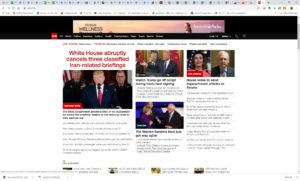In creating and running this site, I was not generating any original reporting on events concerning the Portland protests. However, I feel that my activity did fit within Wikipedia’s definition of journalism:
Journalism is the production and distribution of reports on current events based on facts and supported with proof or evidence.
I was filling the “distribution” role in the above definition. However, I was also performing these roles (per Mindy McAdams):
- Selection of the best representatives: If a museum curator has access to 10,000 small clay tokens from ancient Iraq and Syria, how many — and which ones — should appear inside the glass case? If a journalist is going to provide links to reliable sources about planning for retirement (or breast cancer, or choosing a college), which are the best, clearest, and most up-to-date?
- Culling: How many links is enough, and not too much? If the museum curator puts 100 of those tokens in one case, my eyes will glaze over.
- Provide context: Will you include a bit of explanatory text to show me how each source differs from the others? Why am I looking at this one? Where is it from? How old is it? Why is this one significant?
The Online Journalism Blog also touches on curation:
Curation is a relatively new term in journalism, but the practice is as old as journalism itself. Every act of journalism is an act of curation: think of how a news report or feature selects and combines elements from a range of sources (first hand sources, background facts, first or second hand colour). Not only that: every act of publishing is, too: selecting and combining different types of content to ensure a news or content ‘mix’.
Where I am going with this? Here is my point: when someone collects links on a topic, that is an act of journalism. It is a type of journalism that all of us can pursue and make contributions.
